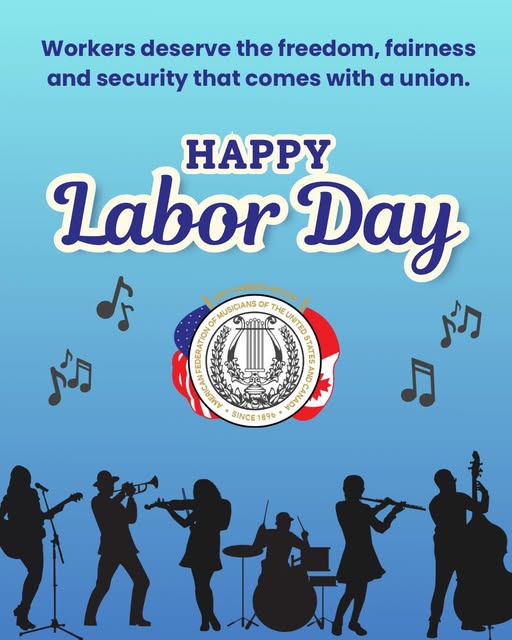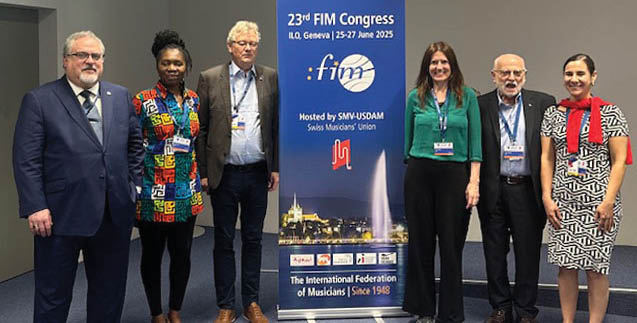First, I must say, I am proud to see so many musicians standing up during this time of political turmoil. During the past few months, we have witnessed unprecedented attacks against due process and freedom of speech on our streets, in our classrooms, and in our workspaces, most recently with the suspension of the Jimmy Kimmel Live! show.
Now is the time to make good trouble and not to remain isolated in our homes and silent in our grief. I am proud that so many of you took up the challenge at the Musicians Against Dictators Rally in Cleveland and Labor Day marches held around the country (see page 20). We are not only fighting for our right to organize, but we are fighting for the constitutional freedoms we once took for granted.
Preparations for SRLA Negotiations
The SRLA—the Sound Recording Labor Agreement with the major labels—is set to expire on January 31, 2026. This contract covers the essential terms and conditions under which musicians are hired to produce sound recordings, and it is one of the most significant agreements for professional recording artists. Our collective goal is simple: to secure a fair, forward-looking agreement that fully addresses the realities of the modern music landscape.
We want every working musician—from independent creators to those working in major studios—to know that your voices and concerns are driving this entire negotiation strategy.
Protecting Artistry from AI Displacement—Musicians’ creative control and financial future are at stake, particularly given the rapid advances in artificial intelligence (AI) technology. AI threatens to diminish the value of human artistry, making it an urgent priority to negotiate strong protections and fair compensation.
Beyond the bargaining table, the union is providing the structure for musicians to be a leading voice in the international conversation on rights. We are actively working in Washington to ensure musicians have a decisive say in how their work is used, sampled, or imitated, advocating for strong mandates that require consent, credit, and compensation.
Expanding Economic Security and Benefits—For too long, access to critical benefits like health insurance and retirement plans has been uneven. We recognize that every working musician deserves these safety nets. Musicians are actively working to expand and improve health and welfare benefits within this contract. Furthermore, the union is actively lobbying Congress and collaborating with the AFL-CIO to advocate for a single-payer system that would provide universal relief to our members.
The Bargaining Mandates Come from the Musicians
The union is building its strategy and demands directly from musician input in order to negotiate an agreement that protects and uplifts their work in the digital age. This contract must ensure that musicians are not only protected from technological displacement but are also fairly compensated for the value their artistry generates.
To achieve this, the following steps are being taken to build the demands directly from the musicians’ ranks and ensure a contract that reflects their needs:
- Bargaining Group Survey: As the union works on priorities for the SRLA contract’s overall structure, members who have worked under previous SRLA contracts will receive a survey. The survey will help identify priorities, including questions about wages, AI protections, health benefits, workload, safety, workplace policies, and organizing independent labels. Your responses increase our power.
- Contract Action Team (CAT): This group of musicians includes voices from all sectors of the recording industry. The CAT will meet regularly to develop and refine the demands, which will be directly incorporated into our core bargaining proposals.
- Open Forums: We are launching a series of member meetings with the CAT, Electronic Media Services Division (EMSD), and AFM leadership beginning this fall. These platforms will give direct feedback to the negotiation committee and provide an opportunity for members to ask questions about the process. Our ability to secure progressive agreements that include these essential protections comes from our unity.
The AFM has the collective power and resources to negotiate with the major labels, production companies, and government entities. Together with EMSD Director John Painting, who continues to provide expertise and guidance on contract language, I am committed to securing contractual provisions that guarantee AI acts as a creative tool rather than a substitute for human artistry. This involves advocating for safeguards that protect musicians’ income and artistic legacy.
The AFM’s strength comes from our collective voice, and that voice is loudest when we create fair standards for everyone in the music industry. However, indie labels are not signatories to the SRLA contract. To close this gap, we’re launching a new initiative through the AFM Organizing Department to work directly with independent musicians, to bring awareness to the various AFM agreements that may more appropriately provide the compensation and protections they deserve.
In addition to contributing your voice through the CAT and the survey, I hope you will become an advocate for this effort. Tell others about AFM recording contracts and how they benefit and protect musicians. Invite nonmember musicians to learn more and join our union.
Your participation in the coming months will be the single most important factor in securing a groundbreaking and equitable SRLA for every working musician. Let’s build a strong contract and a stronger union, together!
Read More



